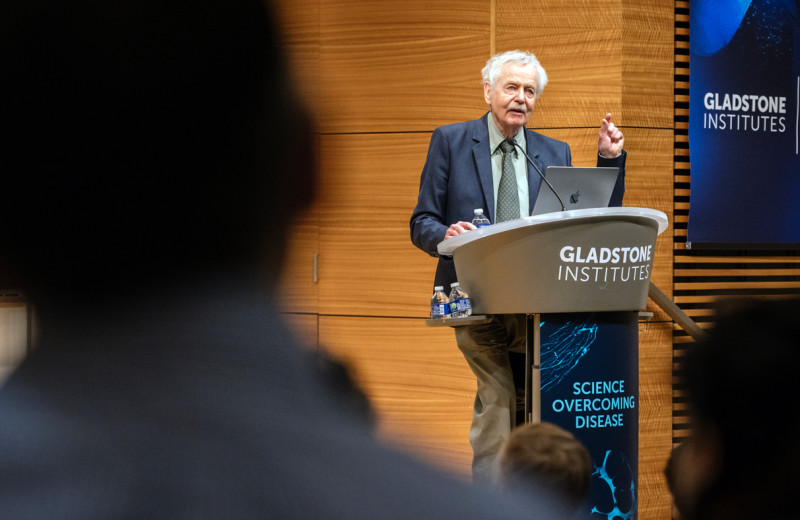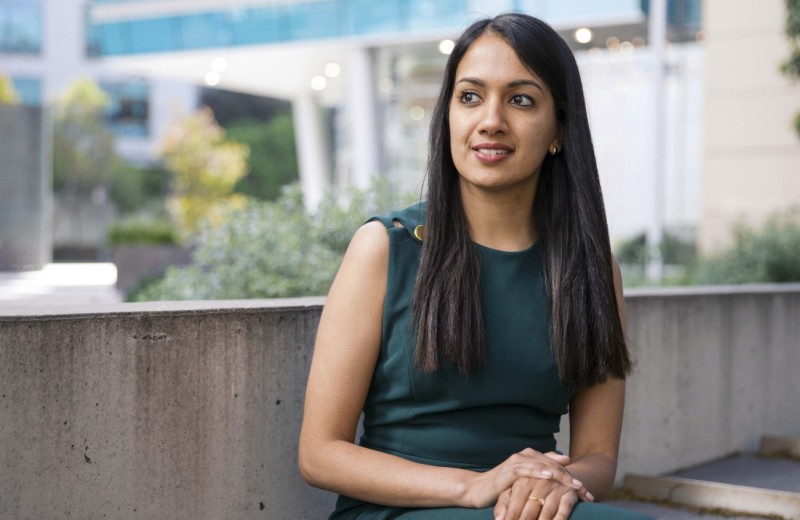Gladstone NOW: The Campaign Join Us on the Journey✕
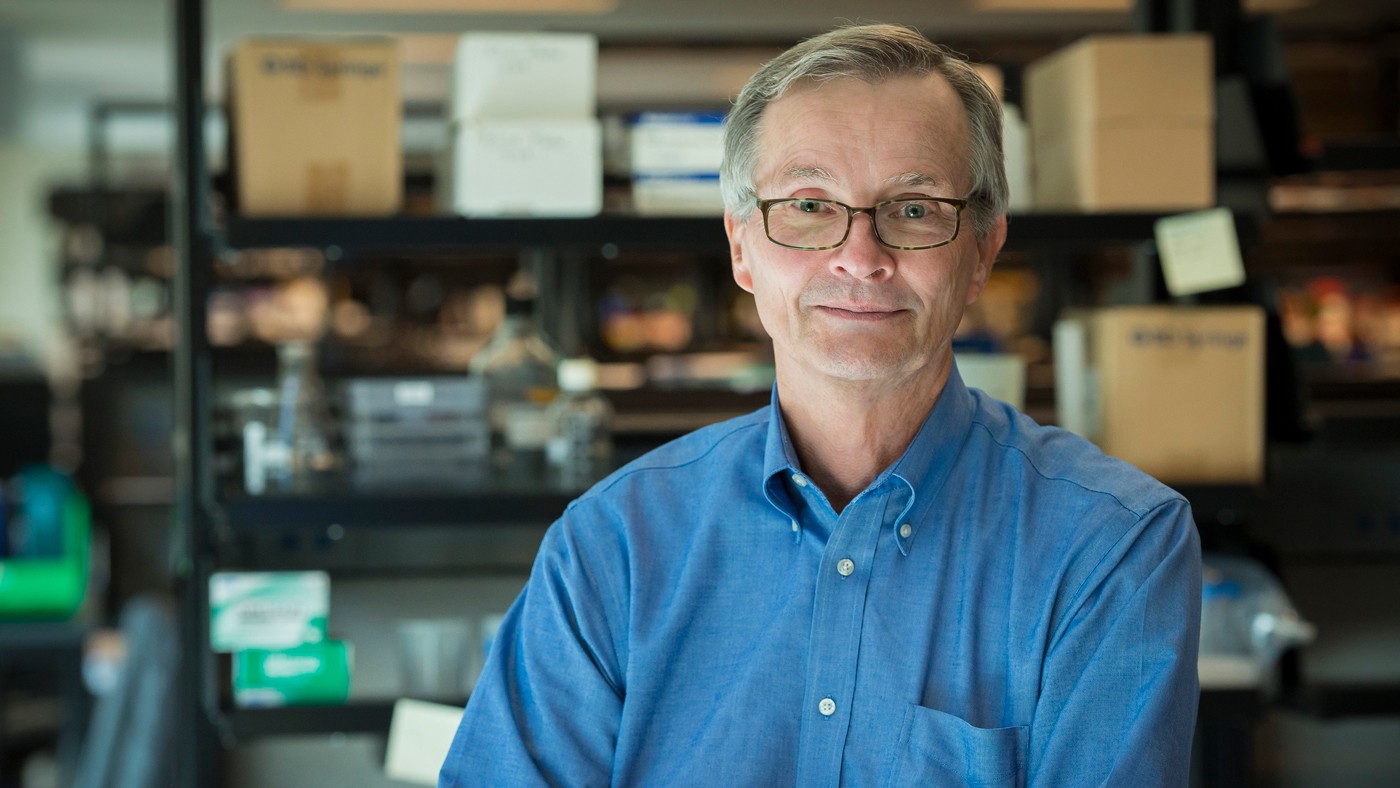
Tom Bersot, a founding Gladstone scientist, has served patients and the biomedical research community for over 40 years.
In May, Tom Bersot, MD, PhD, received the prestigious “Jane Bailowitz, MD, Volunteer Faculty Award” from the UCSF-Zuckerberg San Francisco General (ZSFG) Hospital’s Department of Medicine. This award recognizes volunteer faculty members for their outstanding contributions and assistance to the medical service at ZSFG.
“This well-deserved honor is a fitting tribute to Tom’s four decades of commitment to education, community service, and patient care,” says Deepak Srivastava, MD, president of Gladstone Institutes. “He embodies the excellence, integrity, and teamwork that drive our mission.”
Bersot, one of the original seven scientists who founded Gladstone in 1979, has been a well-loved member of the Gladstone and UC San Francisco (UCSF) clinical community for over 40 years, having made significant national and international contributions to understanding blood cholesterol disorders that cause heart disease. He has also trained thousands of physicians in lipid disorder diagnosis and treatment.
Gladstone supported Bersot’s clinical activities at ZSFG for over four decades—a partnership rooted in Gladstone’s early commitment to the hospital and its care for the underserved population of San Francisco.
“This well-deserved honor is a fitting tribute to Tom’s four decades of commitment to education, community service, and patient care.”
“Tom is the best physician that I have ever known, displaying both outstanding expertise and compassion,” says Robert Mahley, MD, PhD, Gladstone’s president emeritus and senior investigator. “He is also a gifted teacher, capable of boiling down complex medical and scientific issues so they can be easily understood. Without Tom, several of the basic scientific results generated by Gladstone scientists would not have been translated to the clinic.”
Bersot and Mahley began working together in 1967 at Vanderbilt University Medical School, where they studied cholesterol and lipoproteins in the same lab while completing their MD and PhD degrees. During his training, Bersot also met Linda Mahley, another longtime friend and colleague.
“I first met Tom when I was a medical technologist at Vanderbilt, when I taught him and other second-year medical students to do white blood cell counts and hematocrits,” Linda Mahley says. “My memories run deep about our long 55-year friendship—from green-as-grass trainees, to Tom piercing my ears, to the brave move to start Gladstone, to the adventures in the Turkish clinics where we saw 13,000 patients and I did laundry of his ragged tee shirts, to working alongside him in Istanbul and beyond. Whew!! I’m so happy that Tom is receiving this much-deserved honor. We are grateful for what he has done for and among us.”
Clinical Contributions to Research Efforts
While he was delivering care and teaching at UCSF and ZSFG, Bersot ran a clinic at Gladstone that contributed valuable clinical cases and materials for research on blood lipid conditions, such as cholesterol disorders, that lead to cardiovascular disease. Without his involvement, the Gladstone Institute of Cardiovascular Disease would not have made important early discoveries regarding the role of lipoproteins such as apolipoprotein E in heart disease.
Bersot’s skillful care of patients allowed him to build relationships that supported these research efforts. In the 1980s and 1990s, studying macromolecules (such as the proteins that carry cholesterol throughout the body) required huge amounts of patient samples. Bersot’s patients readily provided large volumes of blood and other tissues to support the research of Gladstone’s scientists.
“Tom almost never ended up as the first or last author on a paper, but the papers wouldn’t have happened if it weren’t for him,” says Bob Mahley, Bersot’s friend and colleague of over five decades.
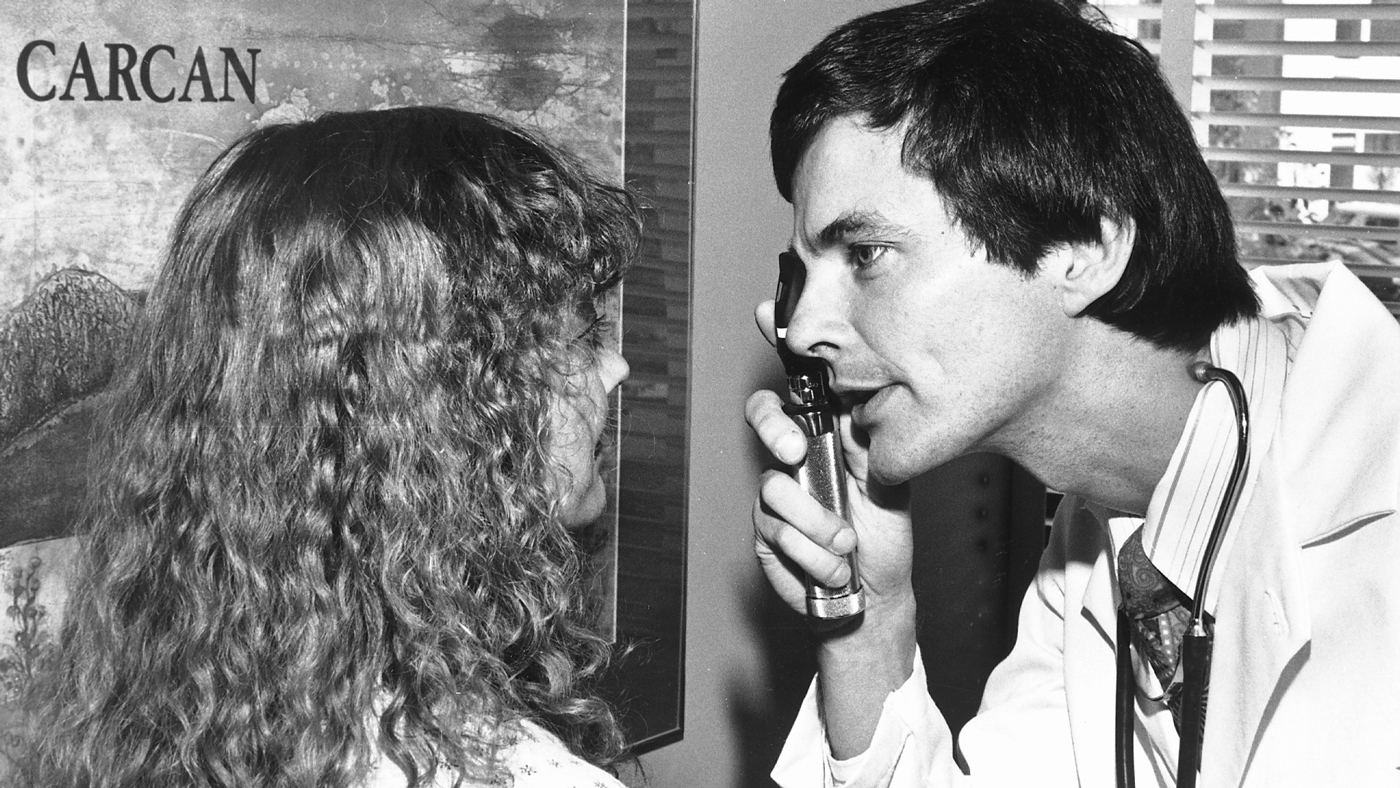
Bersot’s thorough treatment of patients led to several research discoveries in cholesterol disorders.
During his time at the lipid clinics, Bersot and his colleagues determined the prevalence of several newly identified lipid disorders, characterized multiple apolipoprotein variants linked to high cholesterol, and participated in clinical trials for lipid disorder drugs. To this day, the lipid clinic at ZSFG continues to provide high-quality care for underserved populations in San Francisco.
According to an anonymous nomination for the Jane Bailowitz Award, “Dr. Bersot comes to the lipid clinic every week and manages the most complicated lipid patients. He has a special magical way of reassuring patients about taking statin medications. He is incredibly dedicated to patients and preventing/reducing [cardiovascular disease] risk. His knowledge and experience with lipid management is so deep, and he is incredibly generous with sharing his knowledge.”
Helping Patients with Low Levels of Good Cholesterol
Alongside Bob and Linda Mahley, Bersot led a globally renowned genetic epidemiology study, the Turkish Heart Study, from 1995–2003.
Their team sought to understand the molecular mechanisms underlying high rates of atherogenic dyslipidemia, a risk factor for coronary heart disease characterized by low levels of the “good” cholesterol HDL (high-density lipoprotein) in blood, observed in individuals of Turkish descent. The research team led by Bersot and Mahley identified the biochemical basis of low HDL levels observed in Turks.
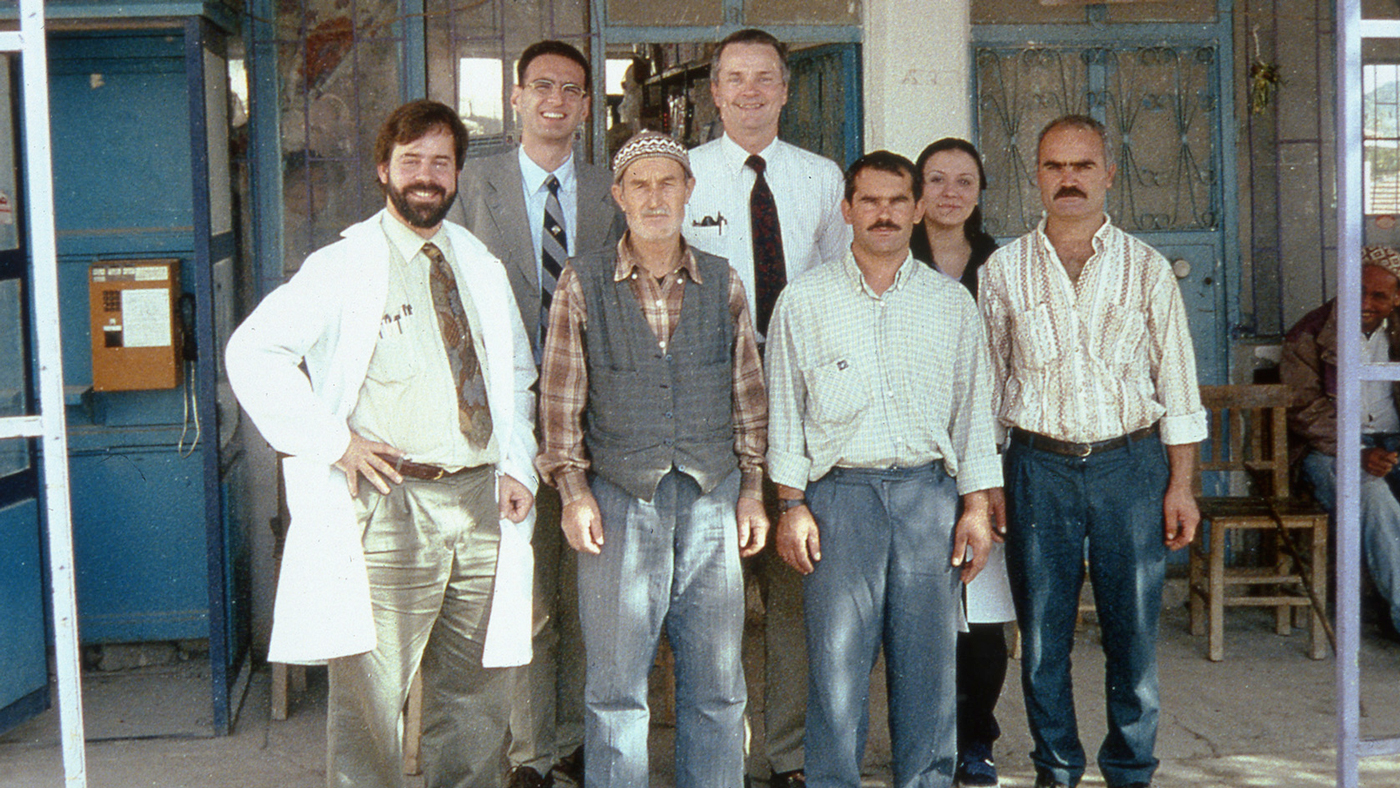
As a co-leader of the Turkish Heart Study, Bersot helped to understand the unique healthcare needs of the Turkish population. Bersot (center) is posing here with scientists and patients from the study in Turkey.
The study resulted in diagnostic and therapeutic guidelines to treat individuals with abnormally low HDL levels, addressing the unique healthcare needs of the high-risk Turkish population and others affected by low HDL.
Training Generations of Physicians
In 1991, Bersot established the Lipid Disorders Training Courses at Gladstone, which continued until his retirement. These courses were educational opportunities designed specifically for health care providers interested in learning how to manage various lipid disorders.
They featured lectures and case discussions of lipid treatment guidelines, diagnosis of various dyslipidemias, dietary and pharmacologic treatments for lipid disorders, factors influencing treatment, and results of recent clinical trials. A unique feature of these courses was a one-day demonstration clinic, in which course participants saw Gladstone Lipid Clinic patients and analyzed their treatment.
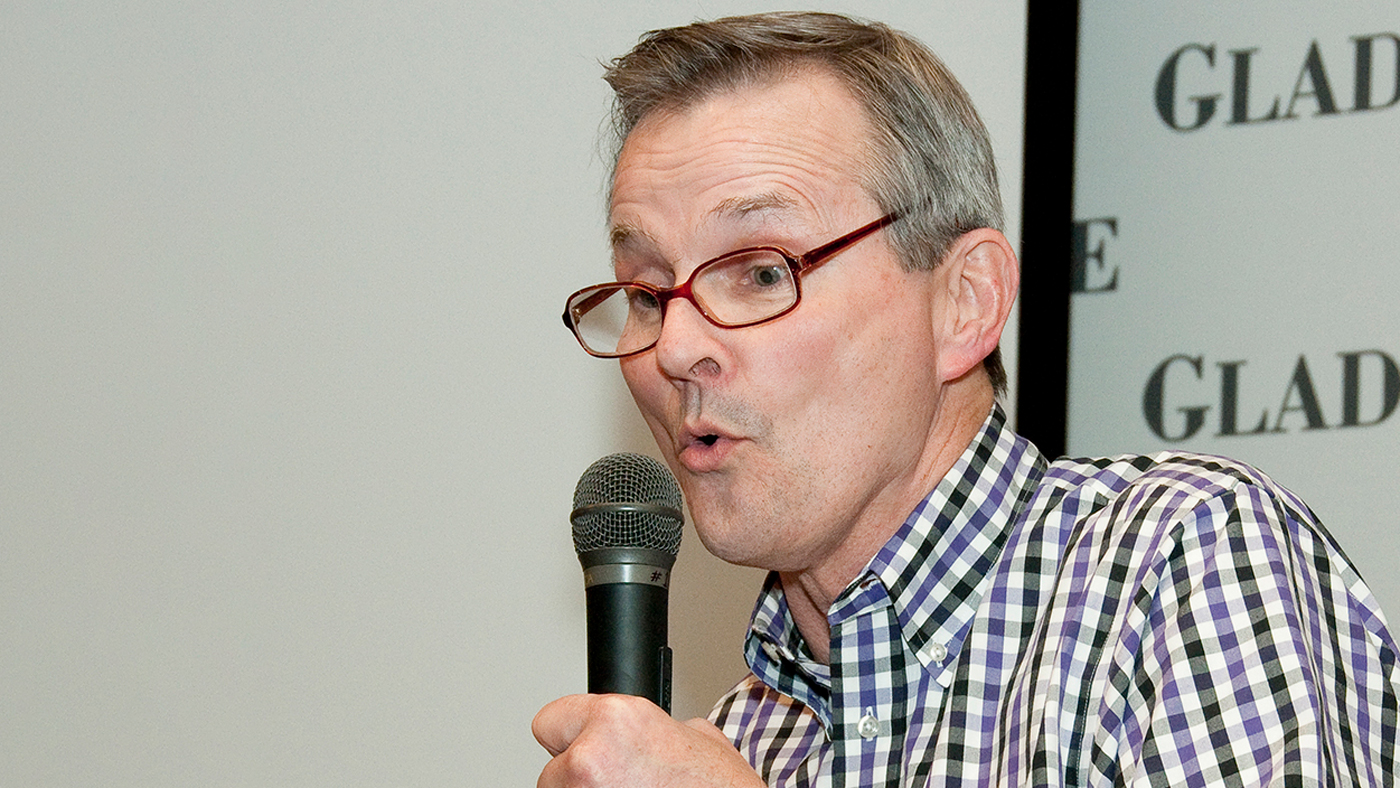
Bersot would often make up and sing jingles to help his students learn concepts in the Lipid Disorders Training Courses.
In total, Bersot’s colleagues estimate that he trained over 8,000 physicians (including thousands of Turkish physicians from his time spent conducting the Turkish Heart Study) throughout his career. He is recognized as one of the top lipid clinicians in the United States.
Another nomination for the Jane Bailowitz Award states, “Dr. Bersot […] has volunteered as director of the ZSFG lipid clinic bringing that expertise to our patients for years. In that role, he educated many hundreds of students, residents, and endocrinology fellows, passing his knowledge along to several generations of physicians.”
Teaching Children About Heart Health and Nutrition
Bersot and his colleagues recognized that heart disease could be prevented or mitigated through behavioral changes such as healthy eating habits in early childhood. So, in 1982, Bersot co-developed SPIN (Special Program in Nutrition) as a community-based education program to promote heart healthy nutrition in children.
The program was initially created for third and fourth grade students using a specially designed curriculum and evaluated in public schools in Millbrae, CA. Its success led to its expansion to over 100 US cities and nine countries, impacting the health and nutrition of thousands of young people.
A Beloved Doctor and Community Servant
Over the course of his career, Bersot made innumerable contributions to cardiovascular research and heart health, both locally and globally.
According to a third nomination for the Jane Bailowitz Award, “Tom continues to be recognized internationally for lipid disorder diagnosis and treatment. Specialty physicians including cardiologists, neurologists, and vascular surgeons rely on [his] wisdom for optimal care of patients with perplexing dyslipidemia. We are so fortunate to have a stellar colleague who understands the most recent and best clinical tools in the field as director of ZSFG Lipid Clinic for more than 40 years.”
Bersot’s career exemplifies the collaboration and translational bridges between basic and clinical research that Gladstone scientists seek to build every day.
A Sculptor of Modern Regenerative Medicine
A Sculptor of Modern Regenerative Medicine
Among his myriad accomplishments, Rudolf Jaenisch—winner of the 2025 Ogawa-Yamanaka Stem Cell Prize—was the first to demonstrate the potential of induced pluripotent stem cells to treat disease.
Awards Ogawa Stem Cell Prize Profile Regenerative Medicine Stem Cells/iPSCsSix Gladstone Scientists Named Among World’s Most Highly Cited Researchers
Six Gladstone Scientists Named Among World’s Most Highly Cited Researchers
The featured scientists include global leaders in gene editing, data science, and immunology.
Awards News Release Corces Lab Doudna Lab Marson Lab Pollard Lab Ye LabBringing Modern Science to Vitamin Biology: Isha Jain Wins NIH Transformative Research Award
Bringing Modern Science to Vitamin Biology: Isha Jain Wins NIH Transformative Research Award
Leveraging modern scientific tools and techniques, Jain intends to transform our understanding of the critical roles that vitamins play in health and disease.
Awards News Release Cardiovascular Disease Jain Lab Metabolism

